Leadership and Management: Roles, Characteristics, Theories
VerifiedAdded on 2020/09/03
|15
|3847
|46
Report
AI Summary
This report provides a comprehensive overview of leadership and management principles, focusing on the roles and characteristics of leaders and managers within an organizational context. It explores the differences between leadership and management, highlighting the importance of bot...
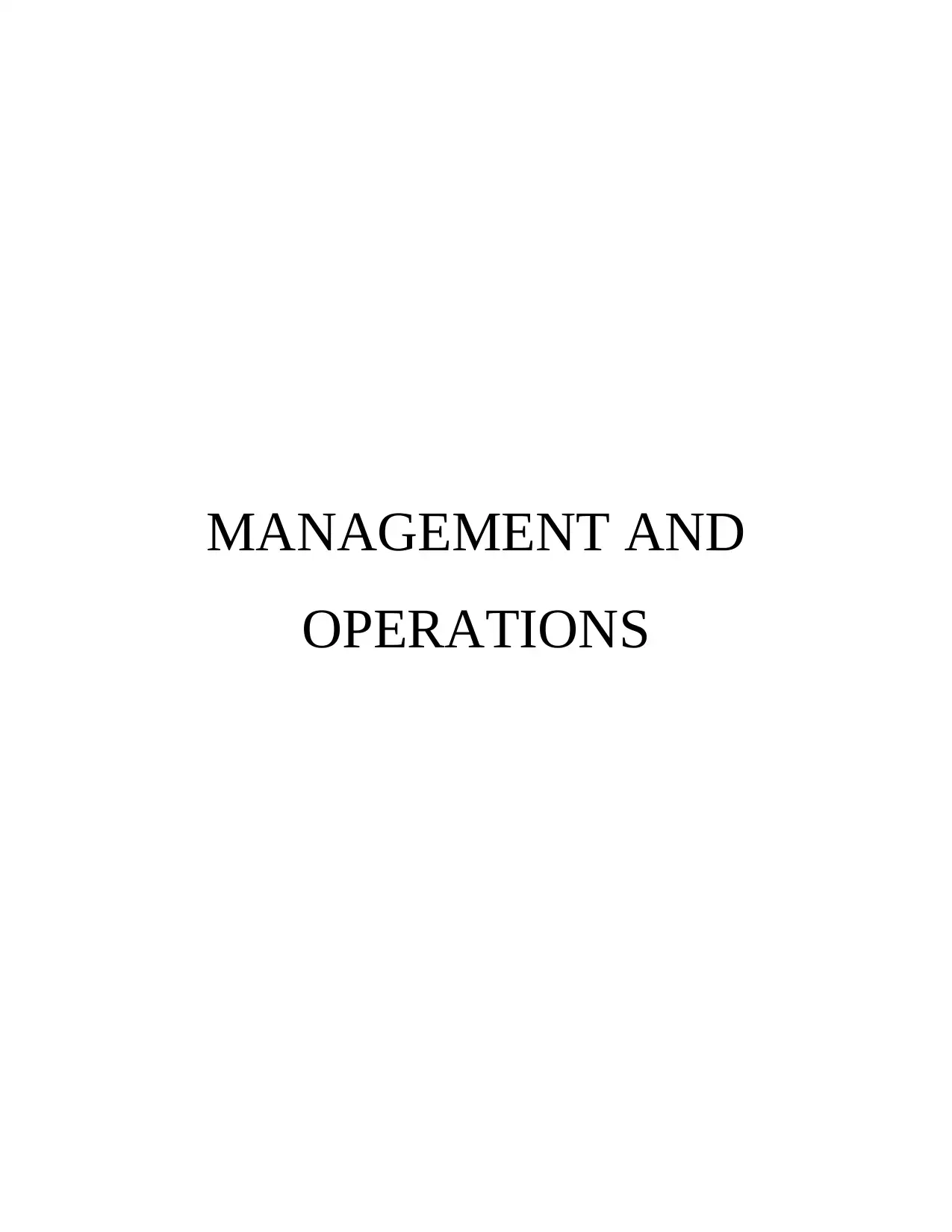
MANAGEMENT AND
OPERATIONS
OPERATIONS
Paraphrase This Document
Need a fresh take? Get an instant paraphrase of this document with our AI Paraphraser

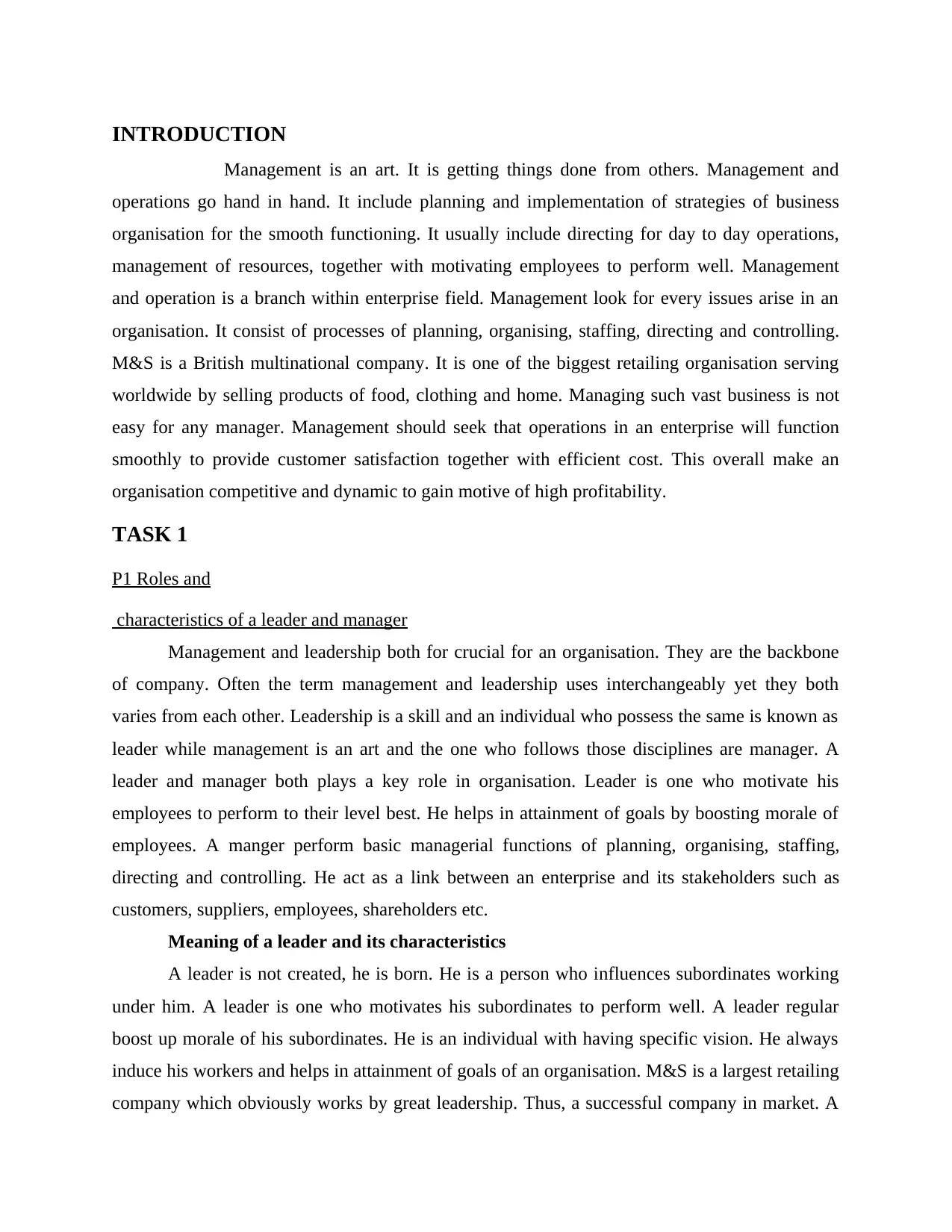
INTRODUCTION
Management is an art. It is getting things done from others. Management and
operations go hand in hand. It include planning and implementation of strategies of business
organisation for the smooth functioning. It usually include directing for day to day operations,
management of resources, together with motivating employees to perform well. Management
and operation is a branch within enterprise field. Management look for every issues arise in an
organisation. It consist of processes of planning, organising, staffing, directing and controlling.
M&S is a British multinational company. It is one of the biggest retailing organisation serving
worldwide by selling products of food, clothing and home. Managing such vast business is not
easy for any manager. Management should seek that operations in an enterprise will function
smoothly to provide customer satisfaction together with efficient cost. This overall make an
organisation competitive and dynamic to gain motive of high profitability.
TASK 1
P1 Roles and
characteristics of a leader and manager
Management and leadership both for crucial for an organisation. They are the backbone
of company. Often the term management and leadership uses interchangeably yet they both
varies from each other. Leadership is a skill and an individual who possess the same is known as
leader while management is an art and the one who follows those disciplines are manager. A
leader and manager both plays a key role in organisation. Leader is one who motivate his
employees to perform to their level best. He helps in attainment of goals by boosting morale of
employees. A manger perform basic managerial functions of planning, organising, staffing,
directing and controlling. He act as a link between an enterprise and its stakeholders such as
customers, suppliers, employees, shareholders etc.
Meaning of a leader and its characteristics
A leader is not created, he is born. He is a person who influences subordinates working
under him. A leader is one who motivates his subordinates to perform well. A leader regular
boost up morale of his subordinates. He is an individual with having specific vision. He always
induce his workers and helps in attainment of goals of an organisation. M&S is a largest retailing
company which obviously works by great leadership. Thus, a successful company in market. A
Management is an art. It is getting things done from others. Management and
operations go hand in hand. It include planning and implementation of strategies of business
organisation for the smooth functioning. It usually include directing for day to day operations,
management of resources, together with motivating employees to perform well. Management
and operation is a branch within enterprise field. Management look for every issues arise in an
organisation. It consist of processes of planning, organising, staffing, directing and controlling.
M&S is a British multinational company. It is one of the biggest retailing organisation serving
worldwide by selling products of food, clothing and home. Managing such vast business is not
easy for any manager. Management should seek that operations in an enterprise will function
smoothly to provide customer satisfaction together with efficient cost. This overall make an
organisation competitive and dynamic to gain motive of high profitability.
TASK 1
P1 Roles and
characteristics of a leader and manager
Management and leadership both for crucial for an organisation. They are the backbone
of company. Often the term management and leadership uses interchangeably yet they both
varies from each other. Leadership is a skill and an individual who possess the same is known as
leader while management is an art and the one who follows those disciplines are manager. A
leader and manager both plays a key role in organisation. Leader is one who motivate his
employees to perform to their level best. He helps in attainment of goals by boosting morale of
employees. A manger perform basic managerial functions of planning, organising, staffing,
directing and controlling. He act as a link between an enterprise and its stakeholders such as
customers, suppliers, employees, shareholders etc.
Meaning of a leader and its characteristics
A leader is not created, he is born. He is a person who influences subordinates working
under him. A leader is one who motivates his subordinates to perform well. A leader regular
boost up morale of his subordinates. He is an individual with having specific vision. He always
induce his workers and helps in attainment of goals of an organisation. M&S is a largest retailing
company which obviously works by great leadership. Thus, a successful company in market. A
⊘ This is a preview!⊘
Do you want full access?
Subscribe today to unlock all pages.

Trusted by 1+ million students worldwide
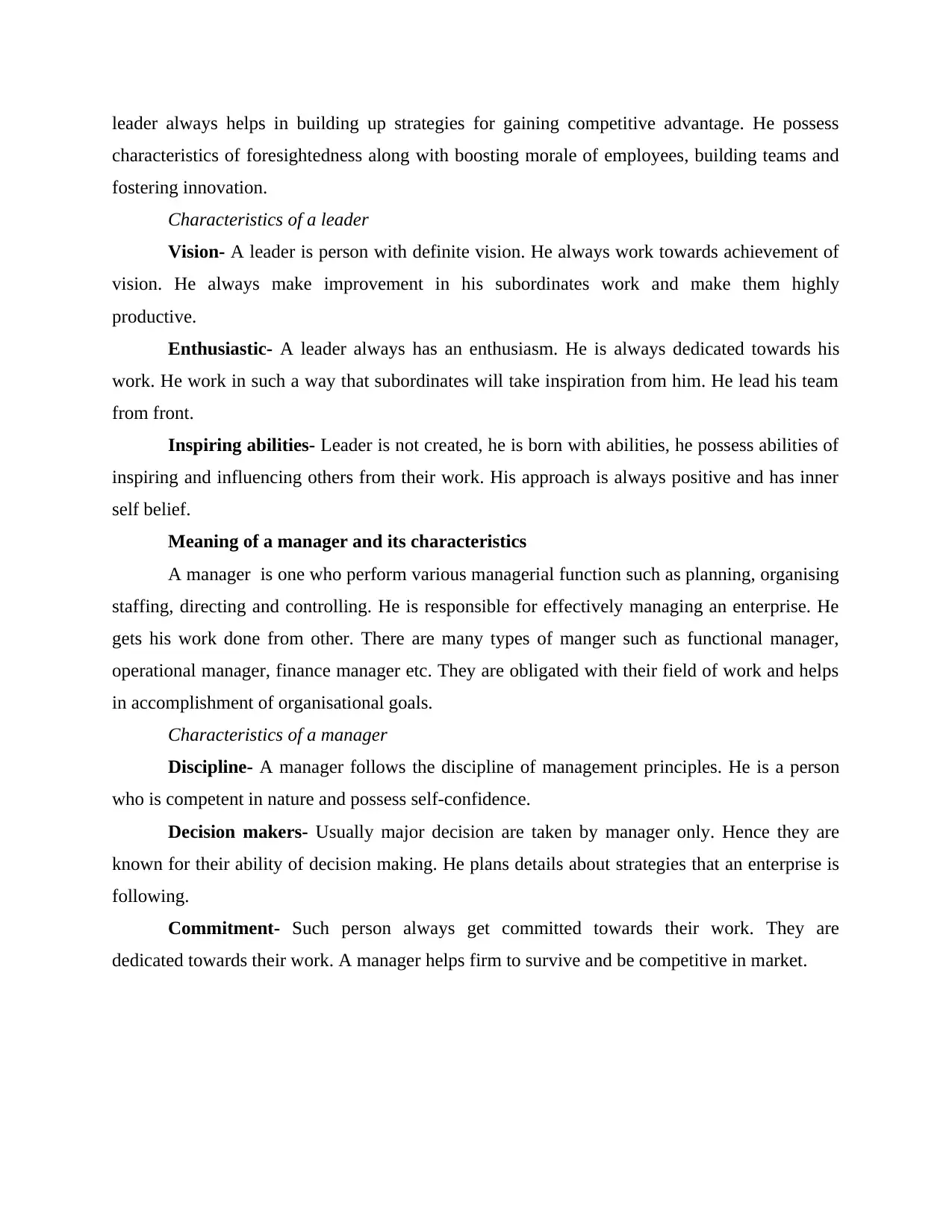
leader always helps in building up strategies for gaining competitive advantage. He possess
characteristics of foresightedness along with boosting morale of employees, building teams and
fostering innovation.
Characteristics of a leader
Vision- A leader is person with definite vision. He always work towards achievement of
vision. He always make improvement in his subordinates work and make them highly
productive.
Enthusiastic- A leader always has an enthusiasm. He is always dedicated towards his
work. He work in such a way that subordinates will take inspiration from him. He lead his team
from front.
Inspiring abilities- Leader is not created, he is born with abilities, he possess abilities of
inspiring and influencing others from their work. His approach is always positive and has inner
self belief.
Meaning of a manager and its characteristics
A manager is one who perform various managerial function such as planning, organising
staffing, directing and controlling. He is responsible for effectively managing an enterprise. He
gets his work done from other. There are many types of manger such as functional manager,
operational manager, finance manager etc. They are obligated with their field of work and helps
in accomplishment of organisational goals.
Characteristics of a manager
Discipline- A manager follows the discipline of management principles. He is a person
who is competent in nature and possess self-confidence.
Decision makers- Usually major decision are taken by manager only. Hence they are
known for their ability of decision making. He plans details about strategies that an enterprise is
following.
Commitment- Such person always get committed towards their work. They are
dedicated towards their work. A manager helps firm to survive and be competitive in market.
characteristics of foresightedness along with boosting morale of employees, building teams and
fostering innovation.
Characteristics of a leader
Vision- A leader is person with definite vision. He always work towards achievement of
vision. He always make improvement in his subordinates work and make them highly
productive.
Enthusiastic- A leader always has an enthusiasm. He is always dedicated towards his
work. He work in such a way that subordinates will take inspiration from him. He lead his team
from front.
Inspiring abilities- Leader is not created, he is born with abilities, he possess abilities of
inspiring and influencing others from their work. His approach is always positive and has inner
self belief.
Meaning of a manager and its characteristics
A manager is one who perform various managerial function such as planning, organising
staffing, directing and controlling. He is responsible for effectively managing an enterprise. He
gets his work done from other. There are many types of manger such as functional manager,
operational manager, finance manager etc. They are obligated with their field of work and helps
in accomplishment of organisational goals.
Characteristics of a manager
Discipline- A manager follows the discipline of management principles. He is a person
who is competent in nature and possess self-confidence.
Decision makers- Usually major decision are taken by manager only. Hence they are
known for their ability of decision making. He plans details about strategies that an enterprise is
following.
Commitment- Such person always get committed towards their work. They are
dedicated towards their work. A manager helps firm to survive and be competitive in market.
Paraphrase This Document
Need a fresh take? Get an instant paraphrase of this document with our AI Paraphraser
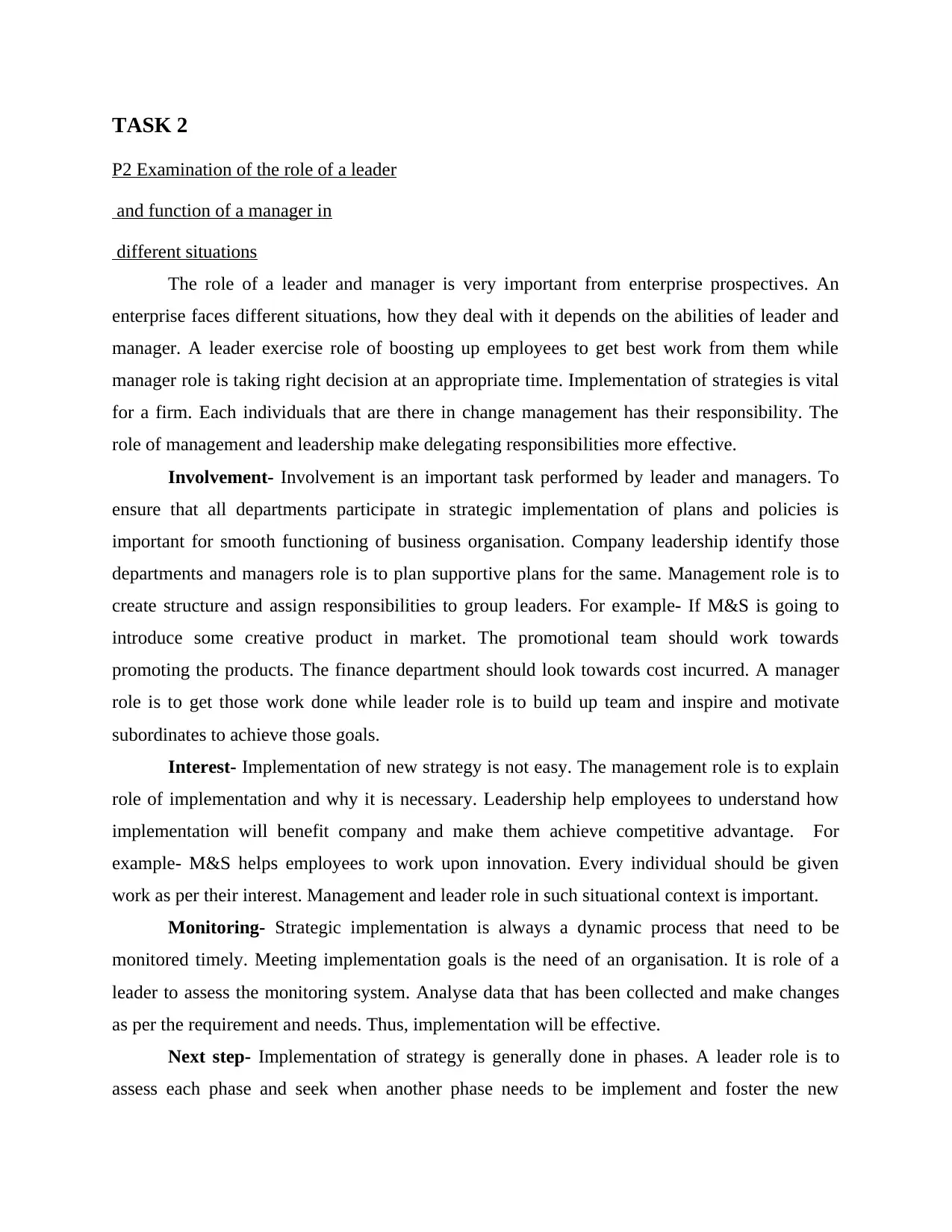
TASK 2
P2 Examination of the role of a leader
and function of a manager in
different situations
The role of a leader and manager is very important from enterprise prospectives. An
enterprise faces different situations, how they deal with it depends on the abilities of leader and
manager. A leader exercise role of boosting up employees to get best work from them while
manager role is taking right decision at an appropriate time. Implementation of strategies is vital
for a firm. Each individuals that are there in change management has their responsibility. The
role of management and leadership make delegating responsibilities more effective.
Involvement- Involvement is an important task performed by leader and managers. To
ensure that all departments participate in strategic implementation of plans and policies is
important for smooth functioning of business organisation. Company leadership identify those
departments and managers role is to plan supportive plans for the same. Management role is to
create structure and assign responsibilities to group leaders. For example- If M&S is going to
introduce some creative product in market. The promotional team should work towards
promoting the products. The finance department should look towards cost incurred. A manager
role is to get those work done while leader role is to build up team and inspire and motivate
subordinates to achieve those goals.
Interest- Implementation of new strategy is not easy. The management role is to explain
role of implementation and why it is necessary. Leadership help employees to understand how
implementation will benefit company and make them achieve competitive advantage. For
example- M&S helps employees to work upon innovation. Every individual should be given
work as per their interest. Management and leader role in such situational context is important.
Monitoring- Strategic implementation is always a dynamic process that need to be
monitored timely. Meeting implementation goals is the need of an organisation. It is role of a
leader to assess the monitoring system. Analyse data that has been collected and make changes
as per the requirement and needs. Thus, implementation will be effective.
Next step- Implementation of strategy is generally done in phases. A leader role is to
assess each phase and seek when another phase needs to be implement and foster the new
P2 Examination of the role of a leader
and function of a manager in
different situations
The role of a leader and manager is very important from enterprise prospectives. An
enterprise faces different situations, how they deal with it depends on the abilities of leader and
manager. A leader exercise role of boosting up employees to get best work from them while
manager role is taking right decision at an appropriate time. Implementation of strategies is vital
for a firm. Each individuals that are there in change management has their responsibility. The
role of management and leadership make delegating responsibilities more effective.
Involvement- Involvement is an important task performed by leader and managers. To
ensure that all departments participate in strategic implementation of plans and policies is
important for smooth functioning of business organisation. Company leadership identify those
departments and managers role is to plan supportive plans for the same. Management role is to
create structure and assign responsibilities to group leaders. For example- If M&S is going to
introduce some creative product in market. The promotional team should work towards
promoting the products. The finance department should look towards cost incurred. A manager
role is to get those work done while leader role is to build up team and inspire and motivate
subordinates to achieve those goals.
Interest- Implementation of new strategy is not easy. The management role is to explain
role of implementation and why it is necessary. Leadership help employees to understand how
implementation will benefit company and make them achieve competitive advantage. For
example- M&S helps employees to work upon innovation. Every individual should be given
work as per their interest. Management and leader role in such situational context is important.
Monitoring- Strategic implementation is always a dynamic process that need to be
monitored timely. Meeting implementation goals is the need of an organisation. It is role of a
leader to assess the monitoring system. Analyse data that has been collected and make changes
as per the requirement and needs. Thus, implementation will be effective.
Next step- Implementation of strategy is generally done in phases. A leader role is to
assess each phase and seek when another phase needs to be implement and foster the new
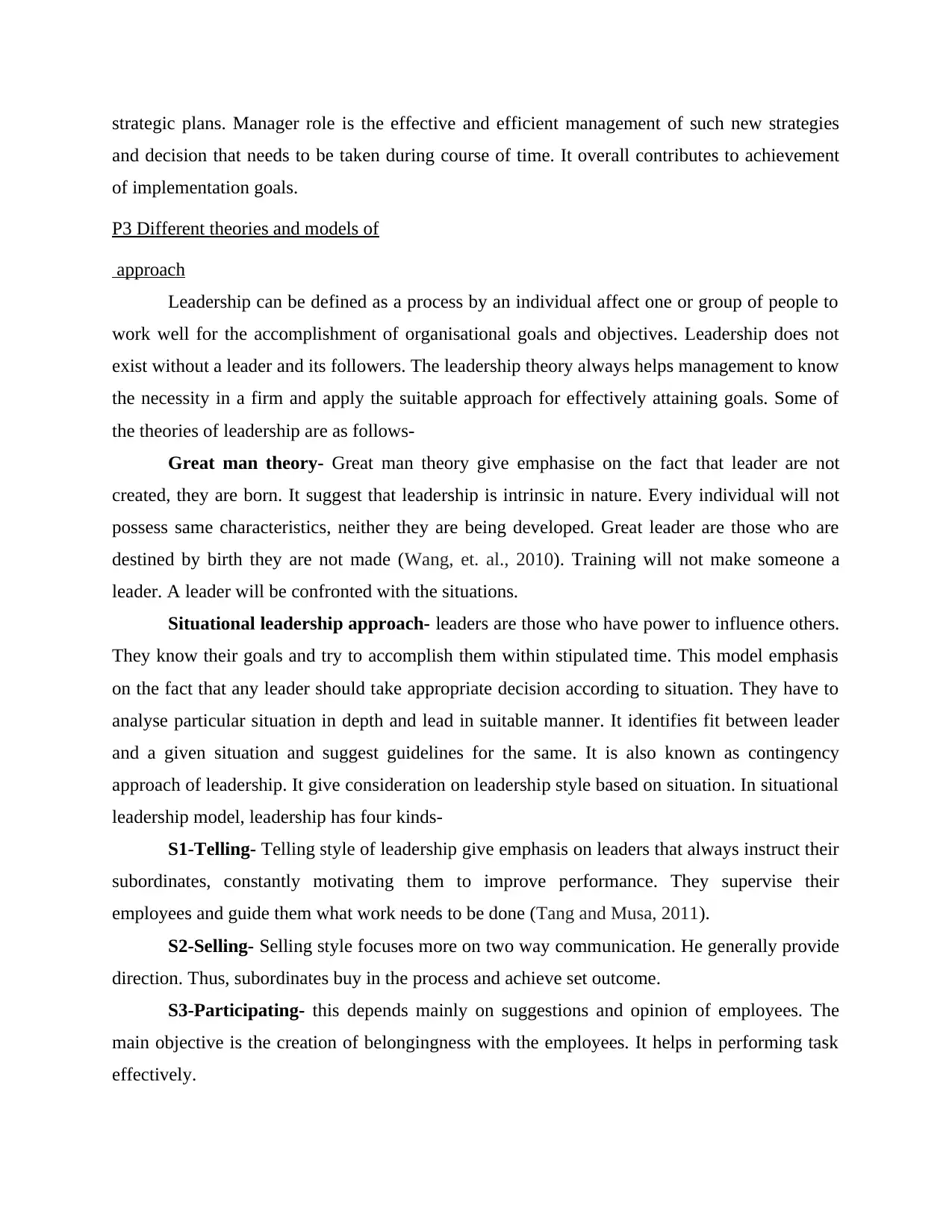
strategic plans. Manager role is the effective and efficient management of such new strategies
and decision that needs to be taken during course of time. It overall contributes to achievement
of implementation goals.
P3 Different theories and models of
approach
Leadership can be defined as a process by an individual affect one or group of people to
work well for the accomplishment of organisational goals and objectives. Leadership does not
exist without a leader and its followers. The leadership theory always helps management to know
the necessity in a firm and apply the suitable approach for effectively attaining goals. Some of
the theories of leadership are as follows-
Great man theory- Great man theory give emphasise on the fact that leader are not
created, they are born. It suggest that leadership is intrinsic in nature. Every individual will not
possess same characteristics, neither they are being developed. Great leader are those who are
destined by birth they are not made (Wang, et. al., 2010). Training will not make someone a
leader. A leader will be confronted with the situations.
Situational leadership approach- leaders are those who have power to influence others.
They know their goals and try to accomplish them within stipulated time. This model emphasis
on the fact that any leader should take appropriate decision according to situation. They have to
analyse particular situation in depth and lead in suitable manner. It identifies fit between leader
and a given situation and suggest guidelines for the same. It is also known as contingency
approach of leadership. It give consideration on leadership style based on situation. In situational
leadership model, leadership has four kinds-
S1-Telling- Telling style of leadership give emphasis on leaders that always instruct their
subordinates, constantly motivating them to improve performance. They supervise their
employees and guide them what work needs to be done (Tang and Musa, 2011).
S2-Selling- Selling style focuses more on two way communication. He generally provide
direction. Thus, subordinates buy in the process and achieve set outcome.
S3-Participating- this depends mainly on suggestions and opinion of employees. The
main objective is the creation of belongingness with the employees. It helps in performing task
effectively.
and decision that needs to be taken during course of time. It overall contributes to achievement
of implementation goals.
P3 Different theories and models of
approach
Leadership can be defined as a process by an individual affect one or group of people to
work well for the accomplishment of organisational goals and objectives. Leadership does not
exist without a leader and its followers. The leadership theory always helps management to know
the necessity in a firm and apply the suitable approach for effectively attaining goals. Some of
the theories of leadership are as follows-
Great man theory- Great man theory give emphasise on the fact that leader are not
created, they are born. It suggest that leadership is intrinsic in nature. Every individual will not
possess same characteristics, neither they are being developed. Great leader are those who are
destined by birth they are not made (Wang, et. al., 2010). Training will not make someone a
leader. A leader will be confronted with the situations.
Situational leadership approach- leaders are those who have power to influence others.
They know their goals and try to accomplish them within stipulated time. This model emphasis
on the fact that any leader should take appropriate decision according to situation. They have to
analyse particular situation in depth and lead in suitable manner. It identifies fit between leader
and a given situation and suggest guidelines for the same. It is also known as contingency
approach of leadership. It give consideration on leadership style based on situation. In situational
leadership model, leadership has four kinds-
S1-Telling- Telling style of leadership give emphasis on leaders that always instruct their
subordinates, constantly motivating them to improve performance. They supervise their
employees and guide them what work needs to be done (Tang and Musa, 2011).
S2-Selling- Selling style focuses more on two way communication. He generally provide
direction. Thus, subordinates buy in the process and achieve set outcome.
S3-Participating- this depends mainly on suggestions and opinion of employees. The
main objective is the creation of belongingness with the employees. It helps in performing task
effectively.
⊘ This is a preview!⊘
Do you want full access?
Subscribe today to unlock all pages.

Trusted by 1+ million students worldwide
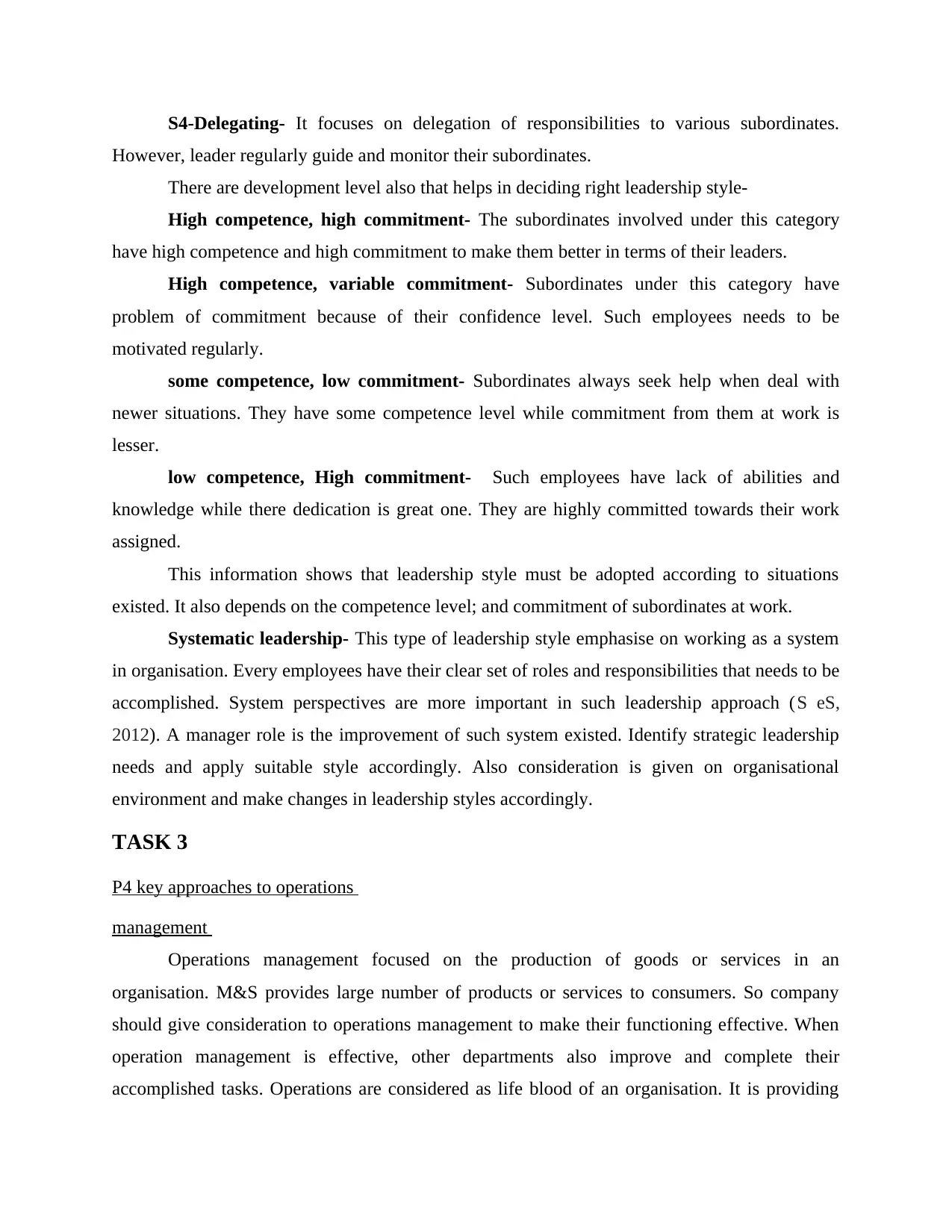
S4-Delegating- It focuses on delegation of responsibilities to various subordinates.
However, leader regularly guide and monitor their subordinates.
There are development level also that helps in deciding right leadership style-
High competence, high commitment- The subordinates involved under this category
have high competence and high commitment to make them better in terms of their leaders.
High competence, variable commitment- Subordinates under this category have
problem of commitment because of their confidence level. Such employees needs to be
motivated regularly.
some competence, low commitment- Subordinates always seek help when deal with
newer situations. They have some competence level while commitment from them at work is
lesser.
low competence, High commitment- Such employees have lack of abilities and
knowledge while there dedication is great one. They are highly committed towards their work
assigned.
This information shows that leadership style must be adopted according to situations
existed. It also depends on the competence level; and commitment of subordinates at work.
Systematic leadership- This type of leadership style emphasise on working as a system
in organisation. Every employees have their clear set of roles and responsibilities that needs to be
accomplished. System perspectives are more important in such leadership approach (S eS,
2012). A manager role is the improvement of such system existed. Identify strategic leadership
needs and apply suitable style accordingly. Also consideration is given on organisational
environment and make changes in leadership styles accordingly.
TASK 3
P4 key approaches to operations
management
Operations management focused on the production of goods or services in an
organisation. M&S provides large number of products or services to consumers. So company
should give consideration to operations management to make their functioning effective. When
operation management is effective, other departments also improve and complete their
accomplished tasks. Operations are considered as life blood of an organisation. It is providing
However, leader regularly guide and monitor their subordinates.
There are development level also that helps in deciding right leadership style-
High competence, high commitment- The subordinates involved under this category
have high competence and high commitment to make them better in terms of their leaders.
High competence, variable commitment- Subordinates under this category have
problem of commitment because of their confidence level. Such employees needs to be
motivated regularly.
some competence, low commitment- Subordinates always seek help when deal with
newer situations. They have some competence level while commitment from them at work is
lesser.
low competence, High commitment- Such employees have lack of abilities and
knowledge while there dedication is great one. They are highly committed towards their work
assigned.
This information shows that leadership style must be adopted according to situations
existed. It also depends on the competence level; and commitment of subordinates at work.
Systematic leadership- This type of leadership style emphasise on working as a system
in organisation. Every employees have their clear set of roles and responsibilities that needs to be
accomplished. System perspectives are more important in such leadership approach (S eS,
2012). A manager role is the improvement of such system existed. Identify strategic leadership
needs and apply suitable style accordingly. Also consideration is given on organisational
environment and make changes in leadership styles accordingly.
TASK 3
P4 key approaches to operations
management
Operations management focused on the production of goods or services in an
organisation. M&S provides large number of products or services to consumers. So company
should give consideration to operations management to make their functioning effective. When
operation management is effective, other departments also improve and complete their
accomplished tasks. Operations are considered as life blood of an organisation. It is providing
Paraphrase This Document
Need a fresh take? Get an instant paraphrase of this document with our AI Paraphraser
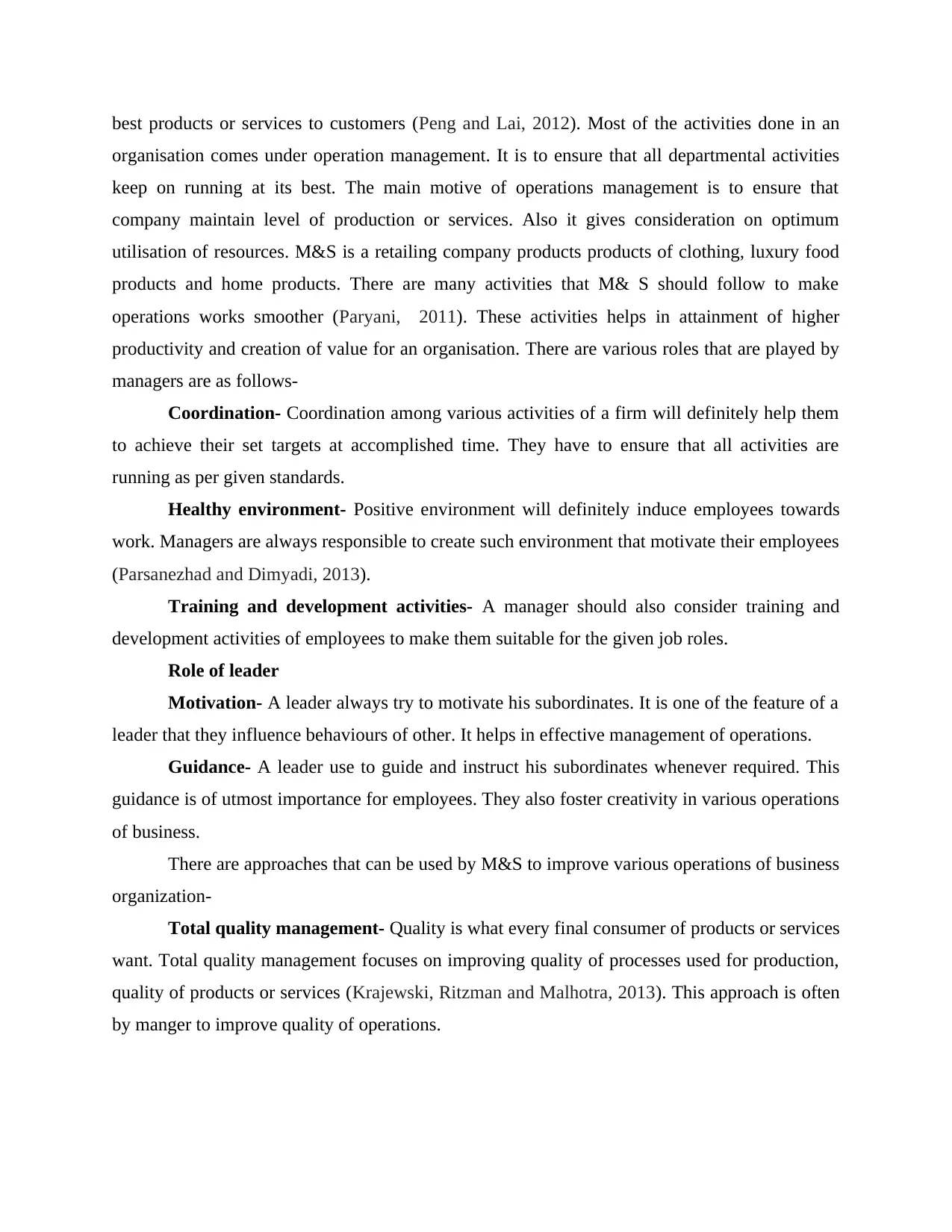
best products or services to customers (Peng and Lai, 2012). Most of the activities done in an
organisation comes under operation management. It is to ensure that all departmental activities
keep on running at its best. The main motive of operations management is to ensure that
company maintain level of production or services. Also it gives consideration on optimum
utilisation of resources. M&S is a retailing company products products of clothing, luxury food
products and home products. There are many activities that M& S should follow to make
operations works smoother (Paryani, 2011). These activities helps in attainment of higher
productivity and creation of value for an organisation. There are various roles that are played by
managers are as follows-
Coordination- Coordination among various activities of a firm will definitely help them
to achieve their set targets at accomplished time. They have to ensure that all activities are
running as per given standards.
Healthy environment- Positive environment will definitely induce employees towards
work. Managers are always responsible to create such environment that motivate their employees
(Parsanezhad and Dimyadi, 2013).
Training and development activities- A manager should also consider training and
development activities of employees to make them suitable for the given job roles.
Role of leader
Motivation- A leader always try to motivate his subordinates. It is one of the feature of a
leader that they influence behaviours of other. It helps in effective management of operations.
Guidance- A leader use to guide and instruct his subordinates whenever required. This
guidance is of utmost importance for employees. They also foster creativity in various operations
of business.
There are approaches that can be used by M&S to improve various operations of business
organization-
Total quality management- Quality is what every final consumer of products or services
want. Total quality management focuses on improving quality of processes used for production,
quality of products or services (Krajewski, Ritzman and Malhotra, 2013). This approach is often
by manger to improve quality of operations.
organisation comes under operation management. It is to ensure that all departmental activities
keep on running at its best. The main motive of operations management is to ensure that
company maintain level of production or services. Also it gives consideration on optimum
utilisation of resources. M&S is a retailing company products products of clothing, luxury food
products and home products. There are many activities that M& S should follow to make
operations works smoother (Paryani, 2011). These activities helps in attainment of higher
productivity and creation of value for an organisation. There are various roles that are played by
managers are as follows-
Coordination- Coordination among various activities of a firm will definitely help them
to achieve their set targets at accomplished time. They have to ensure that all activities are
running as per given standards.
Healthy environment- Positive environment will definitely induce employees towards
work. Managers are always responsible to create such environment that motivate their employees
(Parsanezhad and Dimyadi, 2013).
Training and development activities- A manager should also consider training and
development activities of employees to make them suitable for the given job roles.
Role of leader
Motivation- A leader always try to motivate his subordinates. It is one of the feature of a
leader that they influence behaviours of other. It helps in effective management of operations.
Guidance- A leader use to guide and instruct his subordinates whenever required. This
guidance is of utmost importance for employees. They also foster creativity in various operations
of business.
There are approaches that can be used by M&S to improve various operations of business
organization-
Total quality management- Quality is what every final consumer of products or services
want. Total quality management focuses on improving quality of processes used for production,
quality of products or services (Krajewski, Ritzman and Malhotra, 2013). This approach is often
by manger to improve quality of operations.
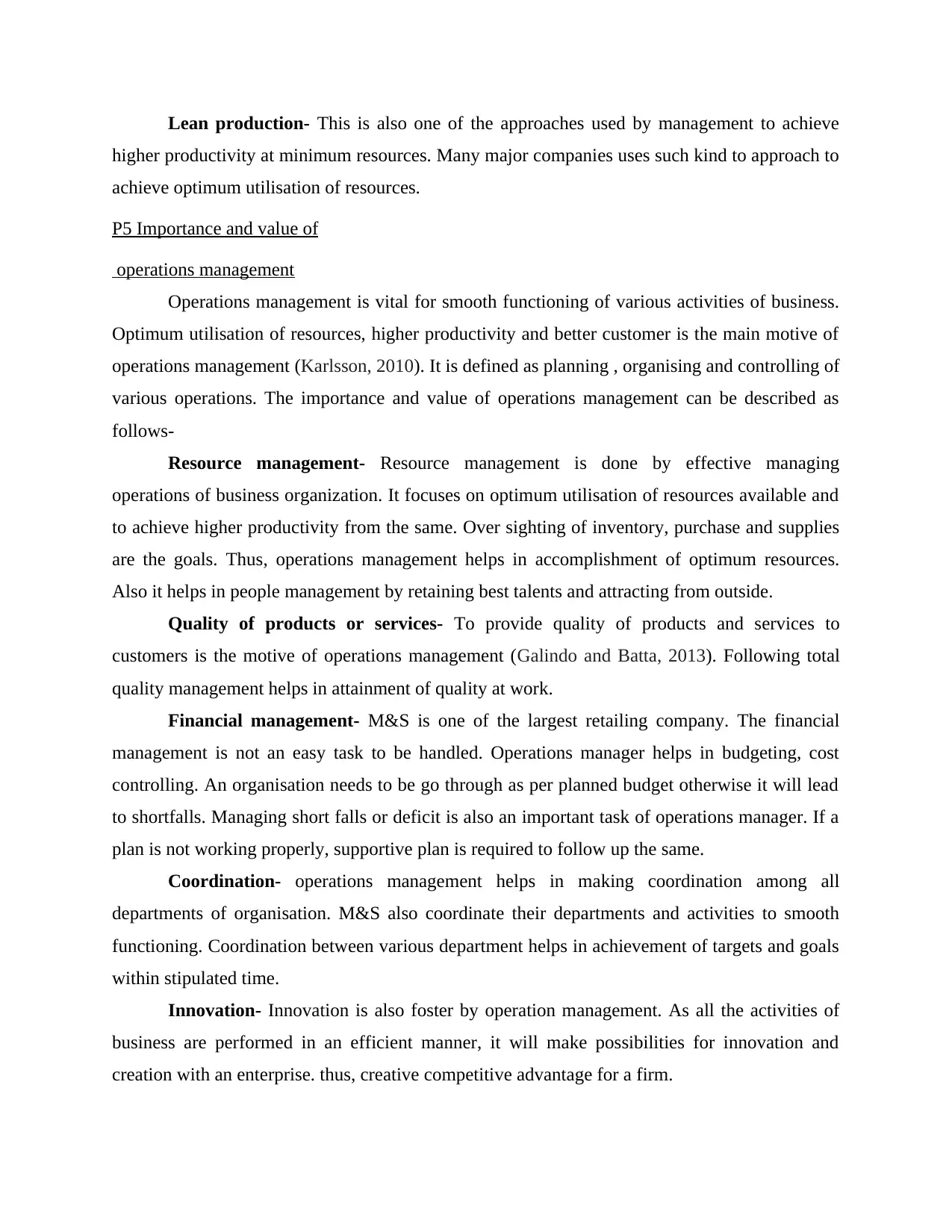
Lean production- This is also one of the approaches used by management to achieve
higher productivity at minimum resources. Many major companies uses such kind to approach to
achieve optimum utilisation of resources.
P5 Importance and value of
operations management
Operations management is vital for smooth functioning of various activities of business.
Optimum utilisation of resources, higher productivity and better customer is the main motive of
operations management (Karlsson, 2010). It is defined as planning , organising and controlling of
various operations. The importance and value of operations management can be described as
follows-
Resource management- Resource management is done by effective managing
operations of business organization. It focuses on optimum utilisation of resources available and
to achieve higher productivity from the same. Over sighting of inventory, purchase and supplies
are the goals. Thus, operations management helps in accomplishment of optimum resources.
Also it helps in people management by retaining best talents and attracting from outside.
Quality of products or services- To provide quality of products and services to
customers is the motive of operations management (Galindo and Batta, 2013). Following total
quality management helps in attainment of quality at work.
Financial management- M&S is one of the largest retailing company. The financial
management is not an easy task to be handled. Operations manager helps in budgeting, cost
controlling. An organisation needs to be go through as per planned budget otherwise it will lead
to shortfalls. Managing short falls or deficit is also an important task of operations manager. If a
plan is not working properly, supportive plan is required to follow up the same.
Coordination- operations management helps in making coordination among all
departments of organisation. M&S also coordinate their departments and activities to smooth
functioning. Coordination between various department helps in achievement of targets and goals
within stipulated time.
Innovation- Innovation is also foster by operation management. As all the activities of
business are performed in an efficient manner, it will make possibilities for innovation and
creation with an enterprise. thus, creative competitive advantage for a firm.
higher productivity at minimum resources. Many major companies uses such kind to approach to
achieve optimum utilisation of resources.
P5 Importance and value of
operations management
Operations management is vital for smooth functioning of various activities of business.
Optimum utilisation of resources, higher productivity and better customer is the main motive of
operations management (Karlsson, 2010). It is defined as planning , organising and controlling of
various operations. The importance and value of operations management can be described as
follows-
Resource management- Resource management is done by effective managing
operations of business organization. It focuses on optimum utilisation of resources available and
to achieve higher productivity from the same. Over sighting of inventory, purchase and supplies
are the goals. Thus, operations management helps in accomplishment of optimum resources.
Also it helps in people management by retaining best talents and attracting from outside.
Quality of products or services- To provide quality of products and services to
customers is the motive of operations management (Galindo and Batta, 2013). Following total
quality management helps in attainment of quality at work.
Financial management- M&S is one of the largest retailing company. The financial
management is not an easy task to be handled. Operations manager helps in budgeting, cost
controlling. An organisation needs to be go through as per planned budget otherwise it will lead
to shortfalls. Managing short falls or deficit is also an important task of operations manager. If a
plan is not working properly, supportive plan is required to follow up the same.
Coordination- operations management helps in making coordination among all
departments of organisation. M&S also coordinate their departments and activities to smooth
functioning. Coordination between various department helps in achievement of targets and goals
within stipulated time.
Innovation- Innovation is also foster by operation management. As all the activities of
business are performed in an efficient manner, it will make possibilities for innovation and
creation with an enterprise. thus, creative competitive advantage for a firm.
⊘ This is a preview!⊘
Do you want full access?
Subscribe today to unlock all pages.

Trusted by 1+ million students worldwide
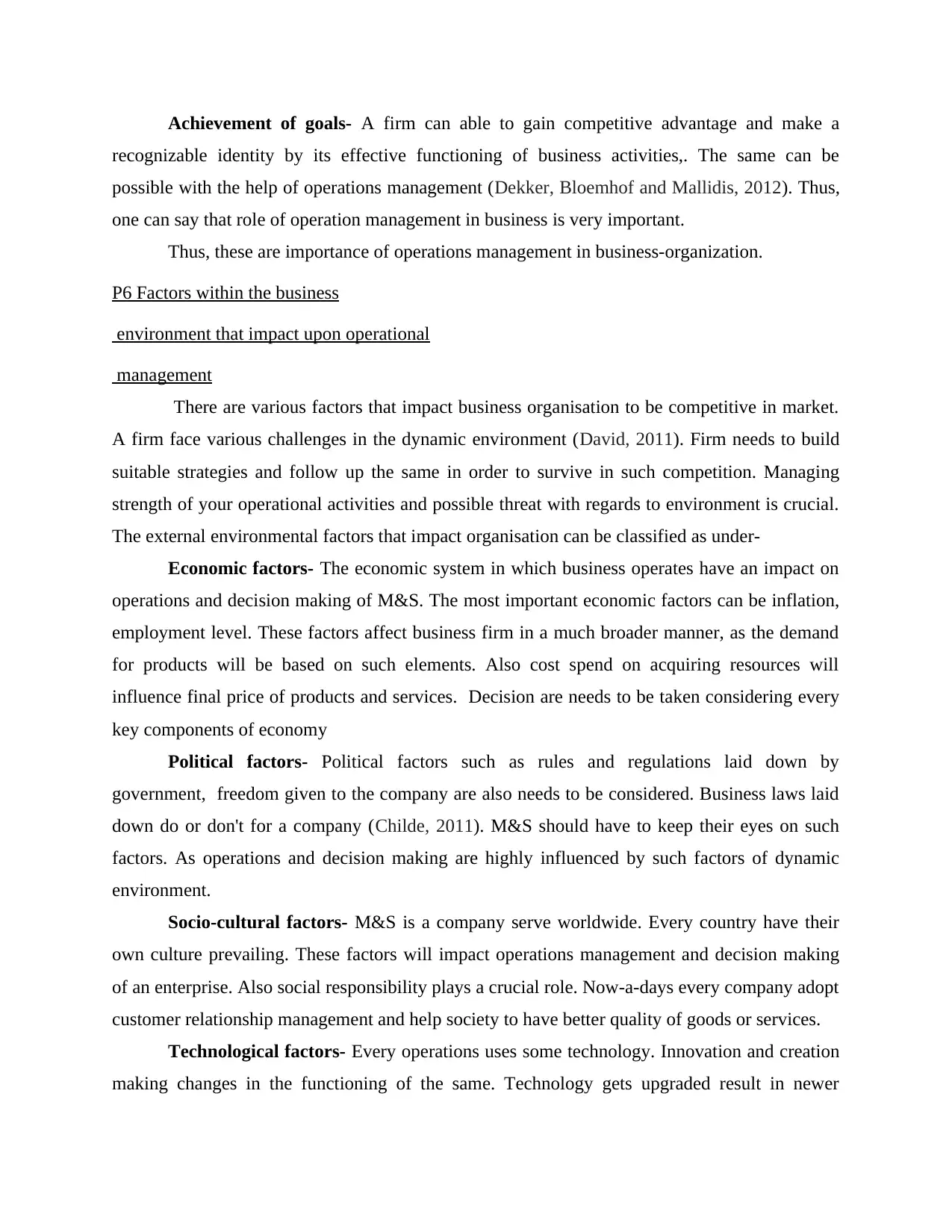
Achievement of goals- A firm can able to gain competitive advantage and make a
recognizable identity by its effective functioning of business activities,. The same can be
possible with the help of operations management (Dekker, Bloemhof and Mallidis, 2012). Thus,
one can say that role of operation management in business is very important.
Thus, these are importance of operations management in business-organization.
P6 Factors within the business
environment that impact upon operational
management
There are various factors that impact business organisation to be competitive in market.
A firm face various challenges in the dynamic environment (David, 2011). Firm needs to build
suitable strategies and follow up the same in order to survive in such competition. Managing
strength of your operational activities and possible threat with regards to environment is crucial.
The external environmental factors that impact organisation can be classified as under-
Economic factors- The economic system in which business operates have an impact on
operations and decision making of M&S. The most important economic factors can be inflation,
employment level. These factors affect business firm in a much broader manner, as the demand
for products will be based on such elements. Also cost spend on acquiring resources will
influence final price of products and services. Decision are needs to be taken considering every
key components of economy
Political factors- Political factors such as rules and regulations laid down by
government, freedom given to the company are also needs to be considered. Business laws laid
down do or don't for a company (Childe, 2011). M&S should have to keep their eyes on such
factors. As operations and decision making are highly influenced by such factors of dynamic
environment.
Socio-cultural factors- M&S is a company serve worldwide. Every country have their
own culture prevailing. These factors will impact operations management and decision making
of an enterprise. Also social responsibility plays a crucial role. Now-a-days every company adopt
customer relationship management and help society to have better quality of goods or services.
Technological factors- Every operations uses some technology. Innovation and creation
making changes in the functioning of the same. Technology gets upgraded result in newer
recognizable identity by its effective functioning of business activities,. The same can be
possible with the help of operations management (Dekker, Bloemhof and Mallidis, 2012). Thus,
one can say that role of operation management in business is very important.
Thus, these are importance of operations management in business-organization.
P6 Factors within the business
environment that impact upon operational
management
There are various factors that impact business organisation to be competitive in market.
A firm face various challenges in the dynamic environment (David, 2011). Firm needs to build
suitable strategies and follow up the same in order to survive in such competition. Managing
strength of your operational activities and possible threat with regards to environment is crucial.
The external environmental factors that impact organisation can be classified as under-
Economic factors- The economic system in which business operates have an impact on
operations and decision making of M&S. The most important economic factors can be inflation,
employment level. These factors affect business firm in a much broader manner, as the demand
for products will be based on such elements. Also cost spend on acquiring resources will
influence final price of products and services. Decision are needs to be taken considering every
key components of economy
Political factors- Political factors such as rules and regulations laid down by
government, freedom given to the company are also needs to be considered. Business laws laid
down do or don't for a company (Childe, 2011). M&S should have to keep their eyes on such
factors. As operations and decision making are highly influenced by such factors of dynamic
environment.
Socio-cultural factors- M&S is a company serve worldwide. Every country have their
own culture prevailing. These factors will impact operations management and decision making
of an enterprise. Also social responsibility plays a crucial role. Now-a-days every company adopt
customer relationship management and help society to have better quality of goods or services.
Technological factors- Every operations uses some technology. Innovation and creation
making changes in the functioning of the same. Technology gets upgraded result in newer
Paraphrase This Document
Need a fresh take? Get an instant paraphrase of this document with our AI Paraphraser
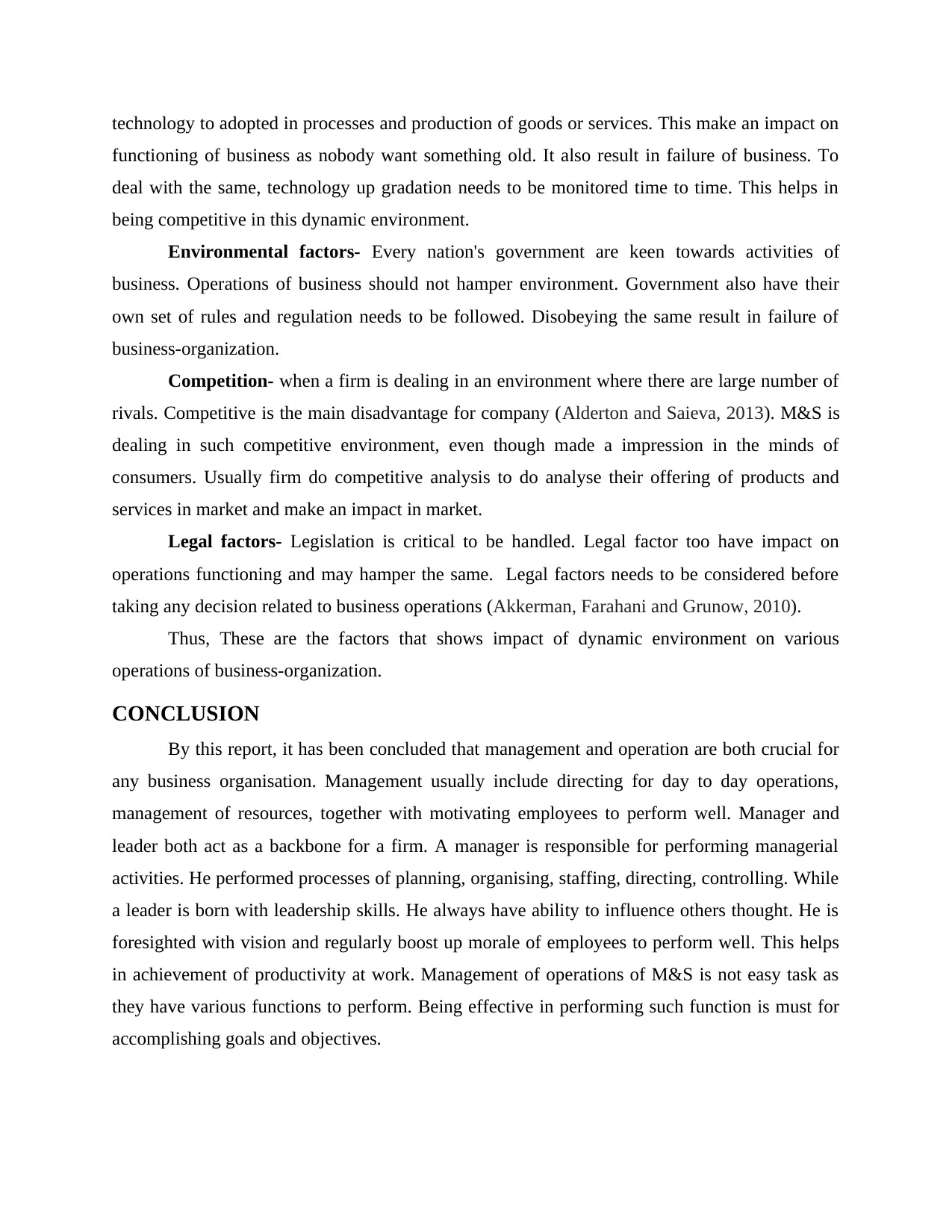
technology to adopted in processes and production of goods or services. This make an impact on
functioning of business as nobody want something old. It also result in failure of business. To
deal with the same, technology up gradation needs to be monitored time to time. This helps in
being competitive in this dynamic environment.
Environmental factors- Every nation's government are keen towards activities of
business. Operations of business should not hamper environment. Government also have their
own set of rules and regulation needs to be followed. Disobeying the same result in failure of
business-organization.
Competition- when a firm is dealing in an environment where there are large number of
rivals. Competitive is the main disadvantage for company (Alderton and Saieva, 2013). M&S is
dealing in such competitive environment, even though made a impression in the minds of
consumers. Usually firm do competitive analysis to do analyse their offering of products and
services in market and make an impact in market.
Legal factors- Legislation is critical to be handled. Legal factor too have impact on
operations functioning and may hamper the same. Legal factors needs to be considered before
taking any decision related to business operations (Akkerman, Farahani and Grunow, 2010).
Thus, These are the factors that shows impact of dynamic environment on various
operations of business-organization.
CONCLUSION
By this report, it has been concluded that management and operation are both crucial for
any business organisation. Management usually include directing for day to day operations,
management of resources, together with motivating employees to perform well. Manager and
leader both act as a backbone for a firm. A manager is responsible for performing managerial
activities. He performed processes of planning, organising, staffing, directing, controlling. While
a leader is born with leadership skills. He always have ability to influence others thought. He is
foresighted with vision and regularly boost up morale of employees to perform well. This helps
in achievement of productivity at work. Management of operations of M&S is not easy task as
they have various functions to perform. Being effective in performing such function is must for
accomplishing goals and objectives.
functioning of business as nobody want something old. It also result in failure of business. To
deal with the same, technology up gradation needs to be monitored time to time. This helps in
being competitive in this dynamic environment.
Environmental factors- Every nation's government are keen towards activities of
business. Operations of business should not hamper environment. Government also have their
own set of rules and regulation needs to be followed. Disobeying the same result in failure of
business-organization.
Competition- when a firm is dealing in an environment where there are large number of
rivals. Competitive is the main disadvantage for company (Alderton and Saieva, 2013). M&S is
dealing in such competitive environment, even though made a impression in the minds of
consumers. Usually firm do competitive analysis to do analyse their offering of products and
services in market and make an impact in market.
Legal factors- Legislation is critical to be handled. Legal factor too have impact on
operations functioning and may hamper the same. Legal factors needs to be considered before
taking any decision related to business operations (Akkerman, Farahani and Grunow, 2010).
Thus, These are the factors that shows impact of dynamic environment on various
operations of business-organization.
CONCLUSION
By this report, it has been concluded that management and operation are both crucial for
any business organisation. Management usually include directing for day to day operations,
management of resources, together with motivating employees to perform well. Manager and
leader both act as a backbone for a firm. A manager is responsible for performing managerial
activities. He performed processes of planning, organising, staffing, directing, controlling. While
a leader is born with leadership skills. He always have ability to influence others thought. He is
foresighted with vision and regularly boost up morale of employees to perform well. This helps
in achievement of productivity at work. Management of operations of M&S is not easy task as
they have various functions to perform. Being effective in performing such function is must for
accomplishing goals and objectives.

⊘ This is a preview!⊘
Do you want full access?
Subscribe today to unlock all pages.

Trusted by 1+ million students worldwide
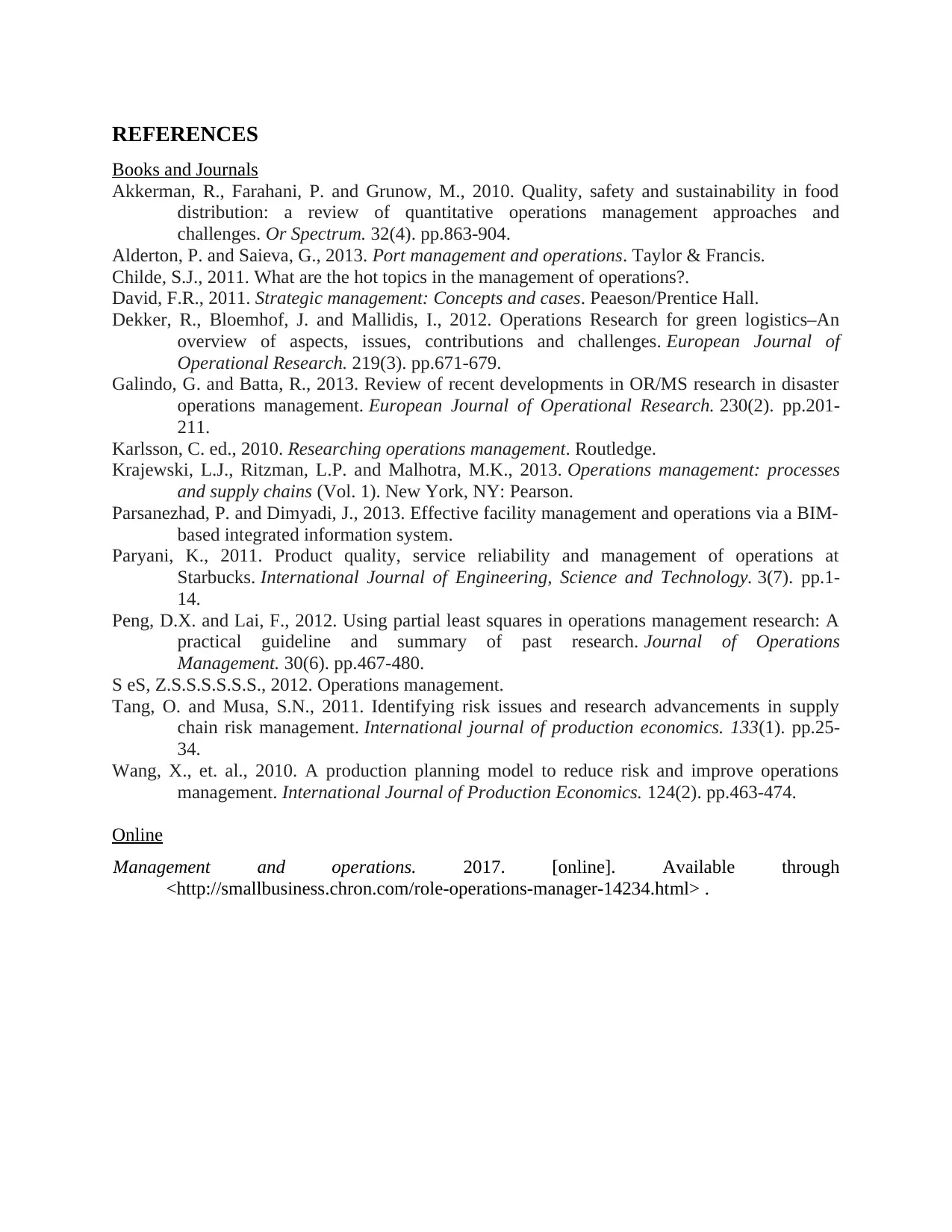
REFERENCES
Books and Journals
Akkerman, R., Farahani, P. and Grunow, M., 2010. Quality, safety and sustainability in food
distribution: a review of quantitative operations management approaches and
challenges. Or Spectrum. 32(4). pp.863-904.
Alderton, P. and Saieva, G., 2013. Port management and operations. Taylor & Francis.
Childe, S.J., 2011. What are the hot topics in the management of operations?.
David, F.R., 2011. Strategic management: Concepts and cases. Peaeson/Prentice Hall.
Dekker, R., Bloemhof, J. and Mallidis, I., 2012. Operations Research for green logistics–An
overview of aspects, issues, contributions and challenges. European Journal of
Operational Research. 219(3). pp.671-679.
Galindo, G. and Batta, R., 2013. Review of recent developments in OR/MS research in disaster
operations management. European Journal of Operational Research. 230(2). pp.201-
211.
Karlsson, C. ed., 2010. Researching operations management. Routledge.
Krajewski, L.J., Ritzman, L.P. and Malhotra, M.K., 2013. Operations management: processes
and supply chains (Vol. 1). New York, NY: Pearson.
Parsanezhad, P. and Dimyadi, J., 2013. Effective facility management and operations via a BIM-
based integrated information system.
Paryani, K., 2011. Product quality, service reliability and management of operations at
Starbucks. International Journal of Engineering, Science and Technology. 3(7). pp.1-
14.
Peng, D.X. and Lai, F., 2012. Using partial least squares in operations management research: A
practical guideline and summary of past research. Journal of Operations
Management. 30(6). pp.467-480.
S eS, Z.S.S.S.S.S.S., 2012. Operations management.
Tang, O. and Musa, S.N., 2011. Identifying risk issues and research advancements in supply
chain risk management. International journal of production economics. 133(1). pp.25-
34.
Wang, X., et. al., 2010. A production planning model to reduce risk and improve operations
management. International Journal of Production Economics. 124(2). pp.463-474.
Online
Management and operations. 2017. [online]. Available through
<http://smallbusiness.chron.com/role-operations-manager-14234.html> .
Books and Journals
Akkerman, R., Farahani, P. and Grunow, M., 2010. Quality, safety and sustainability in food
distribution: a review of quantitative operations management approaches and
challenges. Or Spectrum. 32(4). pp.863-904.
Alderton, P. and Saieva, G., 2013. Port management and operations. Taylor & Francis.
Childe, S.J., 2011. What are the hot topics in the management of operations?.
David, F.R., 2011. Strategic management: Concepts and cases. Peaeson/Prentice Hall.
Dekker, R., Bloemhof, J. and Mallidis, I., 2012. Operations Research for green logistics–An
overview of aspects, issues, contributions and challenges. European Journal of
Operational Research. 219(3). pp.671-679.
Galindo, G. and Batta, R., 2013. Review of recent developments in OR/MS research in disaster
operations management. European Journal of Operational Research. 230(2). pp.201-
211.
Karlsson, C. ed., 2010. Researching operations management. Routledge.
Krajewski, L.J., Ritzman, L.P. and Malhotra, M.K., 2013. Operations management: processes
and supply chains (Vol. 1). New York, NY: Pearson.
Parsanezhad, P. and Dimyadi, J., 2013. Effective facility management and operations via a BIM-
based integrated information system.
Paryani, K., 2011. Product quality, service reliability and management of operations at
Starbucks. International Journal of Engineering, Science and Technology. 3(7). pp.1-
14.
Peng, D.X. and Lai, F., 2012. Using partial least squares in operations management research: A
practical guideline and summary of past research. Journal of Operations
Management. 30(6). pp.467-480.
S eS, Z.S.S.S.S.S.S., 2012. Operations management.
Tang, O. and Musa, S.N., 2011. Identifying risk issues and research advancements in supply
chain risk management. International journal of production economics. 133(1). pp.25-
34.
Wang, X., et. al., 2010. A production planning model to reduce risk and improve operations
management. International Journal of Production Economics. 124(2). pp.463-474.
Online
Management and operations. 2017. [online]. Available through
<http://smallbusiness.chron.com/role-operations-manager-14234.html> .
Paraphrase This Document
Need a fresh take? Get an instant paraphrase of this document with our AI Paraphraser


1
⊘ This is a preview!⊘
Do you want full access?
Subscribe today to unlock all pages.

Trusted by 1+ million students worldwide
1 out of 15
Related Documents
Your All-in-One AI-Powered Toolkit for Academic Success.
+13062052269
info@desklib.com
Available 24*7 on WhatsApp / Email
![[object Object]](/_next/static/media/star-bottom.7253800d.svg)
Unlock your academic potential
© 2024 | Zucol Services PVT LTD | All rights reserved.





